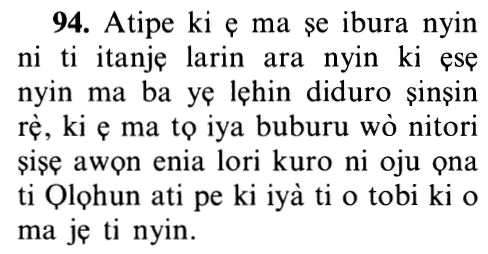16vs94
Select any filter and click on Go! to see results
وَلاَ تَتَّخِذُواْ أَيْمَانَكُمْ دَخَلاً بَيْنَكُمْ فَتَزِلَّ قَدَمٌ بَعْدَ ثُبُوتِهَا وَتَذُوقُواْ الْسُّوءَ بِمَا صَدَدتُّمْ عَن سَبِيلِ اللّهِ وَلَكُمْ عَذَابٌ عَظِيمٌ
Wala tattakhithoo aymanakum dakhalan baynakum fatazilla qadamun baAAda thubootiha watathooqoo alssooa bima sadadtum AAan sabeeli Allahi walakum AAathabun AAatheemun
Index Terms
Click to play
Yoruba Translation

Hausa Translation
Kada ku riƙi rantsuwõyinku dõmin yaudara a tsakãninku, har ƙafa ta yi sulɓi a bãyan tabbatarta, kuma ku ɗanɗani azãba sabõda abin da kuka kange daga hanyar Allah. Kuma kunã da wata azãba mai girma.(1)
Asbabu n-Nuzuul (Occasions of Revelation)
The Prohibition on taking an Oath for Purposes of Treachery
Allah says:
وَلاَ تَتَّخِذُواْ أَيْمَانَكُمْ دَخَلاً بَيْنَكُمْ فَتَزِلَّ قَدَمٌ بَعْدَ ثُبُوتِهَا ...
And do not make your oaths a means of deception among yourselves, resulting in the slip of a foot after it was firmly planted,
Allah warns His servant against taking oaths as means of deception, i.e., using them for treacherous purposes, lest a foot should slip after being firmly planted.
This is an analogy describing one who was on the right path but then deviated and slipped from the path of guidance because of an unfulfilled oath that involved hindering people from the path of Allah. This is because if a disbeliever were to find that after having agreed to a covenant, then the believer betrayed him, then the believer will have hindered him from entering Islam.
Thus Allah says:
... وَتَذُوقُواْ الْسُّوءَ بِمَا صَدَدتُّمْ عَن سَبِيلِ اللّهِ وَلَكُمْ عَذَابٌ عَظِيمٌ ﴿٩٤﴾
and you taste the evil of having hindered from the path of Allah, and you will suffer a terrible punishment.
ثم حذر تعالى عباده عن اتخاذ الأيمان دخلا أي خديعة ومكرا لئلا تزل قدم بعد ثبوتها مثل لمن كان على الاستقامة فحاد عنها وزل عن طريق الهدى بسبب الأيمان الحانثة المشتملة على الصد عن سبيل الله لأن الكافر إذا رأى أن المؤمن قد عاهده ثم غدر به لم يبق له وثوق بالدين فانصد بسببه عن الدخول في الإسلام ولهذا قال " وتذوقوا السوء بما صددتم عن سبيل الله ولكم عذاب عظيم " .
"ولا تتخذوا أيمانكم دخلا بينكم" كرره تأكيدا "فتزل قدم" أي أقدامكم عن محجة الإسلام "بعد ثبوتها" استقامتها عليها "وتذوقوا السوء" أي العذاب "بما صددتم عن سبيل الله" أي بصدكم عن الوفاء بالعهد أو بصدكم غيركم عنه لأنه يستن بكم "ولكم عذاب عظيم" في الآخرة
كرر ذلك تأكيدا .
I'raab - grammatical analysis of the Qur'an
«وَلا تَتَّخِذُوا» الواو استئنافية ولا ناهية ومضارع مجزوم بحذف النون والواو فاعل.
«أَيْمانَكُمْ دَخَلًا» مفعولا تتخذوا والكاف مضاف إليه.
«بَيْنَكُمْ» ظرف مكان متعلق بدخلا والكاف مضاف إليه والجملة مستأنفة.
«فَتَزِلَّ» الفاء فاء السببية ومضارع منصوب بأن المضمرة بعد فاء السببية.:
«قَدَمٌ» فاعل.
«بَعْدَ» ظرف متعلق بتزل.
«ثُبُوتِها» مضاف إليه والهاء مضاف إليه.
«وَتَذُوقُوا» معطوف على تزل منصوب مثله بحذف النون والواو فاعل.
«السُّوءَ» مفعول به.
«بِما» ما مصدرية.
«صَدَدْتُمْ» ماض وفاعله والمصدر المؤول مجرور بالياء متعلقان بتذوقوا.
«عَنْ سَبِيلِ» متعلقان بصددتم.
«اللَّهِ» لفظ جلالة مضاف إليه.
«وَلَكُمْ عَذابٌ» لكم متعلقان بمحذوف خبر وعذاب مبتدأ والجملة حالية.
«عَظِيمٌ» صفة.
